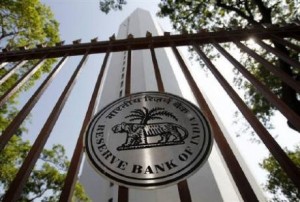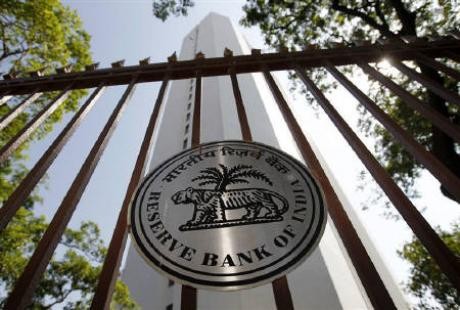News Point: The Reserve Bank of India (RBI) has maintained status quo on key policy rates in its third bimonthly monetary policy review of the financial year.
 This is the second straight monetary policy review in which the central bank has kept the repo rates unchanged. The RBI Governor has tried to accommodate the concerns of the business community at large, while being prudent with the emerging realities of the Indian economy.
This is the second straight monetary policy review in which the central bank has kept the repo rates unchanged. The RBI Governor has tried to accommodate the concerns of the business community at large, while being prudent with the emerging realities of the Indian economy.
Incidentally, this has been the last policy review by outgoing RBI Governor Raghuram Rajan. The central bank maintained the repo rate, the rate at which commercial banks borrow from the central bank, at 6.5 per cent while maintaining the cash reserve ratio (CRR) at 4 per cent. RBI also announced an open market operation on August 11 to frontload liquidity.
“Continue to provide liquidity as required, but lower the average ex-ante liquidity deficit in the system progressively from one per cent of NDTL to a position closer to neutrality,” RBI said in a statement.
Rate Realities
- The RBI Governor Raghuram kept the repo rate unchanged in his last policy review
- Rajan has not been very popular among the real estate for his suggestion to developers to cut down the prices
- Developers maintain RBI’s hawkish stand and high interest rates are major deterrents
- The banks have not passed on the benefits of earlier rate cut by the RBI to the home buyers
The real estate sector that is reeling under the prolonger spell of slow sales has cried foul on the expected lines. While the RBI governor in his oft-repeated stand has been advising the developers to cut down the prices to get the business cycle moving, the developers have maintained that high interest rate is a major deterrent to revive the housing market.
Getamber Anand, CREDAI National President asserts that considering that the country has been blessed with good monsoon this year, the developers were anticipating that the RBI would take a more balanced and futuristic view in consideration and definitely grant a cut as far as interest rates were concerned.
“Unfortunately, we have been disappointed again. Having said that, the 150 BSP reduction in the repo rate that was granted until now has not really been passed down to the end user in form of either retail loans, home loans or any other loans. This needs to be taken up by the banks and lending institutions immediately,” says Anand.
However, Sunil Kumar Sinha, Principal Economist, India Ratings & Research admits that as expected RBI kept the policy rates unchanged in the third bi-monthly policy review of 2016-17. According to him, on the positive side RBI noted that (i) Kharif sowing has gathered pace, after a lacklustre start particularly with respect to pulses; (ii) some signs of improvement in business confidence; and (iii) liquidity conditions have eased and yields on government bond have dropped. However, on the negative side RBI noted that (i) retail inflation in the month of June was at a 22nd month high, mainly driven by food items; (ii) Brexit has increased the volatility in global financial markets worldwide, resulting in investors looking for safe havens.
“Overall RBI’s assessment is guided by the trajectory inflation may take in the near term, given the stickiness in the food and services inflation. The implementation of the 7th central pay commission (CPC) award is expected to have a direct impact on the house rent component of CPI. Thus, India Ratings believes, risks to the inflation outlook seem to be tilted to the upside and a status quo on policy rates has been the correct stance,” says Sinha.
Vineet Relia, Managing Director of SARE Homes also believes that the RBI Governor Raghuram Rajan’s decision to hold the repo rate steady at 6.5 per cent is along expected lines.
“This being his last policy pronouncement, many sectors, including real estate, were hoping he would pull a surprise by announcing a modest cut, but rising inflationary trends in recent months pre-empted such a possibility. Nevertheless, given the government’s goal of pegging inflation at around 4 per cent within five years, this seems best, particularly since retail inflation is presently at a two-year high,” says Relia.
Rattan Hawelia, Chairman of Hawelia Group has a caveat here when he adds that it is not the RBI alone that can revive the housing market with some rate cut. He believes the time has come when the policy makers (including the Finance Minister, Housing Minister & RBI) in their collective consciousness have to devise the ways & means to ignite the sector that has the potential to create more jobs and lead to turnaround of the Indian economy.
“Rate cut of some BSP is welcome but not enough as we have seen in the past. The fact is that the banks have not passed it on to the home buyers or any other retail customers. Hence, expecting miracle from the RBI would be a short sighted demand. I feel the representatives of the sector should come forward with a blue print that would be feasible and acceptable to all the policy makers, including the RBI. A rate cut should be then a logical conclusion of the changed policy framework,” suggests Hawelia.
It is to be seen whether a sector that reacts after every monetary policy review would really be pro-active to embrace any such suggestion. However, as of now they have insisted that if the economy has to grow in double digits, real estate will need to be supported by a low interest regime, as is the norm across the world. Having seen inflation controlled at 5 per cent, there is no reason for such a high interest regime.
The ball is hence now in the court of the successor of Raghuram Rajan and the sector hopes that he will be more industry friendly to offer the rate cut. To what extent that really happens and to what extent that revives the fortunes of the sector is to be seen in the next couple of monetary policy reviews.
By: Ravi Sinha






1 Comment
It is highly unfortunate that nobody has really touched the point which Rajan had pointed. Currently FD interest rate is on an average 7%. Anything less than this will not invite deposits not only from home investors or from NRIs. NRI deposits in term of FOREX come to India simply because FD interest offered here is more compared to average 1.5% offered abroad. If Repo rate is reduced so will the FD rate. When FOREX will not come, real estate will get affected.Country’s economy will suffer. 1% rate cut is not going to increase demand. It will increase when builders will become more transparent and honest, increase their efficiency by hiring and paying good consultants. Even in the current scenario, builders vist abroad on buyer’s money at least 4 times a year. Where from this money comes when they don’t have money to pay toconsultants.